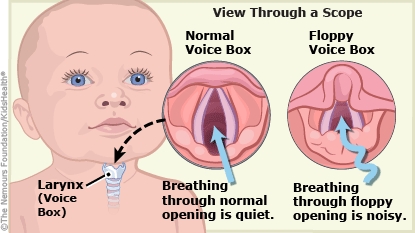Laryngomalacia: How to Care for Your Child
Babies with laryngomalacia (or "floppy voice box") have noisy breathing because their airways fall in and get partly blocked. This is usually harmless, but the baby makes a harsh or squeaky sound when breathing in. Laryngomalacia tends to get better as a baby gets older.


-
If your health care provider prescribed medicine, give it to your baby as directed.
-
Take small breaks while feeding to allow your baby to catch their breath.
-
Schedule regular follow-up visits so the health care provider can make sure your baby is eating and growing normally.

Your child:
-
is more irritable or tired than usual
-
is breathing faster or harder than usual
-
isn't feeding as well as usual

-
Your child has trouble breathing, or the skin between the ribs and neck pulls in during breathing.
-
Your child has pauses in breathing.

What is laryngomalacia? Laryngomalacia is a softness in the larynx (voice box) that some babies are born with. When they breathe in, the part of the voice box above the vocal cords falls in, partly blocking the airway. This can cause a high-pitched or harsh sound called stridor. It may happen only some of the time or get louder in certain situations — for example, when the baby is sleeping, crying, or feeding.
How is laryngomalacia diagnosed? Health care providers usually diagnose laryngomalacia by asking the parent about the baby's symptoms and doing an exam. They may recommend a laryngoscopy to confirm the diagnosis. In this procedure, an otolaryngologist (ear, nose, and throat doctor) passes a thin tube with a small camera at the end down the baby's throat to look for laryngomalacia and other problems that can cause stridor.
How is laryngomalacia treated? Most babies grow out of laryngomalacia, so treatment often isn't needed if a baby is feeding and growing well. Treatments for laryngomalacia include:
-
medicine for gastroesophageal reflux (GER)
-
feeding therapy
-
surgery, if a baby has trouble eating, poor growth, or breathing problems